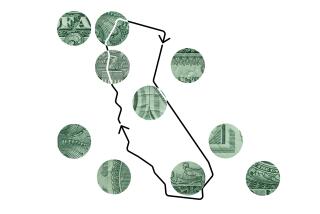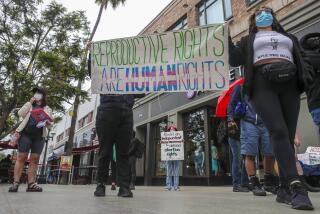Illinois Angles for Sponsors to Close Budget Gap
- Share via
CHICAGO — Illinois Gov. Rod Blagojevich is seeking corporate sponsors for his hard-up state, and local wags have been quick with suggestions: Sell Weight Watchers the naming rights to Starved Rock State Park. Ask Butterball to sponsor the wildlife refuge at Turkey Bluffs.
Blagojevich, however, isn’t joking. After struggling to close a $5-billion budget deficit last spring, his administration is scrambling for every last dollar. And it’s not beyond tapping corporate America for help.
Selling naming rights to state parks is off-limits for now -- deemed too crass. But Deputy Gov. Bradley Tusk said he would love to auction off the title of “official beverage of Illinois,” “official Internet provider” or even “official roller skate.”
If Ford would donate cars to the state fleet, he’d put the company’s logo on every bumper. If Nike would resurface beat-up playgrounds, he’d make sure kids on the courts saw the familiar swoosh.
“It’s not like we expect [private donations] to solve our budget deficits,” Tusk said. But, he added, every little bit helps. And it could restore some programs and services eliminated during budget cuts.
Illinois is the first state aggressively searching for private partners. Dozens of cities have already started, seeking underwriters for parks, pools and in Virginia Beach, Va., even the prosecutor’s office. States as diverse as Massachusetts and Kansas are considering similar moves; Democrats and Republicans back the concept.
The trend unnerves some residents. In Illinois, Republican state Sen. Steve Rauschenberger vows to fight it, insisting that “state government is not a charity.”
But others say they’re fine with the idea of public agencies passing the hat.
“If they can get money from someone else so they don’t have to raise my taxes, I say, ‘Go for it,’ ” said Susan Morris, 43, an administrative coordinator in Chicago. “I’m sure that [the state and its sponsors] will have to scratch each other’s back a bit, but that’s how politics works.”
Residents of Beverly, Mass., seem equally pragmatic: They have accepted a plan to sell advertising space on school buses. Local real estate agents, toy stores and fitness centers have snatched up the space, raising $60,000 for the cash-strapped school district.
“It’s saved 1 1/2 teachers,” Supt. Bill Lupini said, adding that he had not received any complaints. “People understand why we’ve done it.”
Most sponsorship deals across the country fall into one of three categories:
The most straightforward is modeled on the “Adopt-a-Highway” program. A firm purchases or maintains public property -- a bike path, perhaps, or a rescue helicopter -- and is recognized with a sign on-site.
In the last few years, more complex deals have emerged, notably with beverage companies. Cities or school districts sell a firm the exclusive right to set up vending machines on public property and, in return, get a percentage of sales. This month, New York City auctioned exclusive beverage rights to Snapple for $166 million over five years.
A few jurisdictions have taken public-private partnerships even further.
San Diego, for instance, has assumed some marketing duties for Cardiac Science Inc., an Irvine-based maker of heart defibrillators. The manufacturer covers the salaries of two city employees who are assigned to sell defibrillators to schools, hotels and other venues. For every $2,140 defibrillator they sell, Cardiac Science deposits $125 in San Diego’s general fund. That money pays for an additional two city employees, who are in charge of teaching residents how to use the devices.
After two years of partnership, San Diego has nearly 900 defibrillators placed around the city -- far more than any other urban area. The devices have saved nine lives.
Because a panel of residents evaluated every defibrillator on the market before selecting Cardiac Science as the city’s partner, officials said they had no qualms about pitching the product. “This was all done very fairly,” said Maureen O’Connor, a former paramedic who runs the program.
Under a similar deal with Verizon Wireless, the city’s development director hawks Verizon cellular service to municipal employees and their families. In return, Verizon deposits $200,000 a year into the city’s general fund.
While marketing Verizon’s service, “all I can say is that we have a partnership, not that they have the best network in San Diego,” said the development director, Mary Braunwarth. “There’s a fine line between sponsorship and advertising.”
It’s a line that critics fear has been blurred -- not only in San Diego, but across the country.
Every time a public agency puts a corporate logo on its property, “there’s an implicit endorsement of that company,” said Gary Ruskin, who runs a nonprofit group dedicated to stamping out such deals. His group, Commercial Alert, claims 2,000 members and is based in Portland, Ore.
“It’s a joke when your town gets turned into a huckster for soda or bail bonds or Enron,” Ruskin said.
Yet increasingly, corporations are demanding that type of endorsement when they give.
“Many just want to do good. But some are decreasing their traditional philanthropy in favor of efforts that will get them more exposure,” said Kathleen Whitter, who tracks such trends for the Center for Corporate Citizenship at Boston College.
“It’s safe to say that 15 years ago, you didn’t have companies thinking about philanthropy as a branding opportunity,” she added.
Today, she said, they do.
Pushing her infant triplets along the promenade at Chicago’s Montrose Harbor, Sally Tajkowski said the trend troubled her. Waterfronts elsewhere in the country have become prime spots for sponsorship, with benches and trashcans bearing corporate logos.
“Who needs that?” Tajkowski asked.
“We’re here because this is a chance to get out in nature. It’s peaceful. Let’s keep it like that.”
But Sharon Murphy, who waited for the sunset with her arm around her daughter, disagreed. She said she would gladly trade the unspoiled view of Lake Michigan for corporate cash -- if the city would use it to provide more children’s activities at the harbor.
“We buy Coke and Pepsi to drink out here anyway,” Murphy said. “They might as well put up a few signs.”
More to Read
Sign up for Essential California
The most important California stories and recommendations in your inbox every morning.
You may occasionally receive promotional content from the Los Angeles Times.













